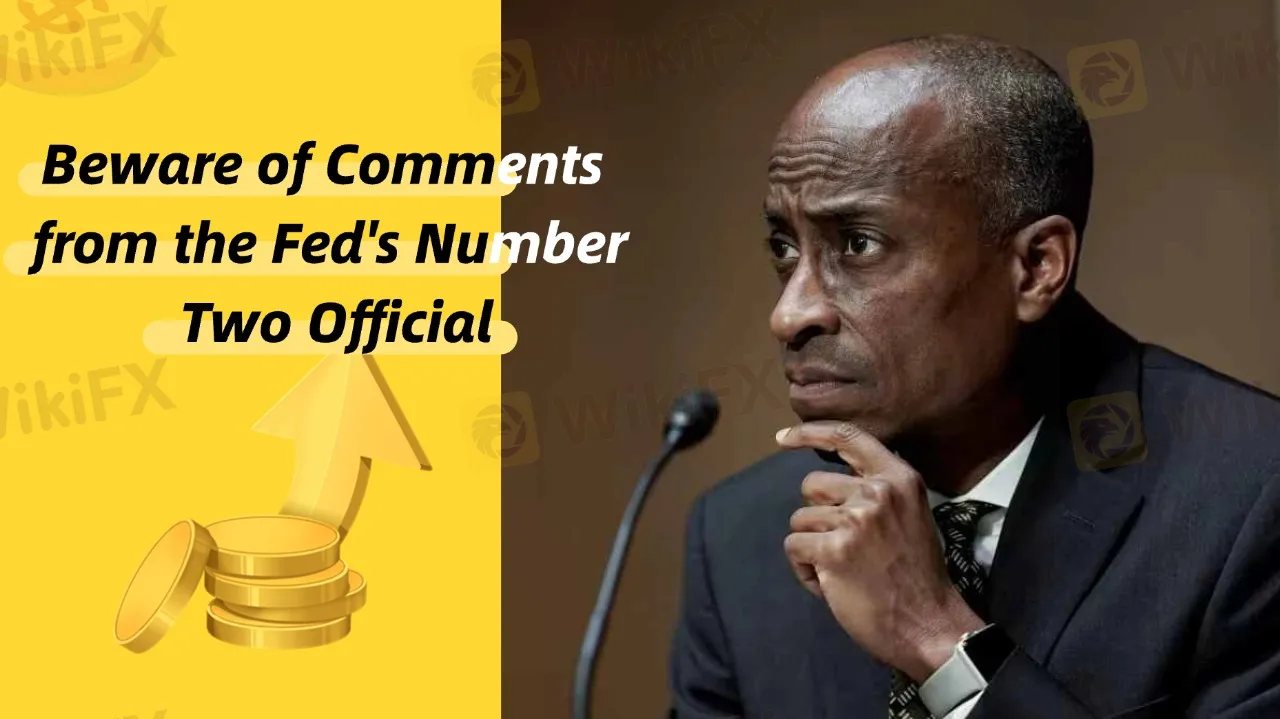简体中文
繁體中文
English
Pусский
日本語
ภาษาไทย
Tiếng Việt
Bahasa Indonesia
Español
हिन्दी
Filippiiniläinen
Français
Deutsch
Português
Türkçe
한국어
العربية
Beware of Comments from the Fed's Number Two Official
Abstract:Federal Reserve Vice Chairman Philip Jefferson's recent remarks have attracted widespread attention in the market.

Speaking at Lafayette College in Easton, Pennsylvania, Jefferson stated that while the path to reducing inflation will remain challenging, he is optimistic about the continued cooling of price pressures. He emphasized that as long as the economy and labor market remain strong, the Fed should cautiously adjust interest rates. Jefferson's comments conveyed a relatively optimistic view of the economic outlook, while also signaling a cautious approach the Fed may take in policy-making.
For investors, Jefferson's speech carries significant implications. First, he made it clear that although inflation may continue to decline, the process could be volatile. This means that investors need to be aware that inflationary pressures may not disappear immediately, and uncertainty in the market remains.

At the same time, Jefferson suggested that economic growth may be slightly lower than expected in 2024, but strong consumer spending could help drive economic recovery. His remarks send a signal of confidence in the economy, while also warning investors that policymakers may adjust monetary policy flexibly in response to changes in the economy and market conditions.
Looking ahead, the Federal Reserve will face a series of complex challenges. First, the issue of inflation remains, and although the Fed has already implemented several rate hikes, ensuring effective control of inflation is still an unresolved issue.
Meanwhile, the strong performance of the labor market means that the Fed must be cautious when adjusting interest rates to avoid tightening monetary policy too much, which could slow down the economy. Additionally, President Trump's economic policies may introduce further uncertainty into the Fed's decision-making process, and how the Fed responds to these external factors will be a key task in the coming months.
In the face of these challenges, investors should maintain a cautious stance. While Vice Chairman Jefferson's optimistic outlook provides some market signals, the volatility of inflation and the uncertain economic environment still pose risks.
Therefore, investors should closely monitor the Fed's further statements and economic data, and adjust their investment strategies flexibly. In the context of increasing global economic uncertainty, diversification and risk management remain effective strategies for navigating market volatility.

Disclaimer:
The views in this article only represent the author's personal views, and do not constitute investment advice on this platform. This platform does not guarantee the accuracy, completeness and timeliness of the information in the article, and will not be liable for any loss caused by the use of or reliance on the information in the article.
Read more

OctaFX Flagged by Malaysian Authorities
OctaFX has been officially listed on warning lists by both Bank Negara Malaysia (BNM) and the Securities Commission Malaysia (SC). These alerts raise serious concerns about the broker’s status and whether it is legally allowed to operate in Malaysia.

TradingPRO: A Closer Look at Its Licences
In an industry where safety and transparency are essential, the regulatory status of online brokers has never been more important. For traders seeking to protect their capital, ensuring that a platform operates under recognised and stringent oversight can make all the difference. Keep reading to learn more about TradingPRO and its licenses.

Oil Price Breakout Incoming? Investors Should Stay Alert
Oil prices are hovering around a critical level, with potential yet to be fully unleashed. Investors must prepare for sudden changes.

New SEBI Regulations on Intraday Trading
The Securities and Exchange Board of India (SEBI) has implemented revised regulations on Intraday trading, with effect from November 20, 2024. These regulations are meant to lessen risks and prevent speculative trading practices.
WikiFX Broker
Latest News
SkyLine Guide 2025 Malaysia: 100 Esteemed Judges Successfully Assembled
Vantage Markets Review 2025: Trusted Forex and CFD Trading Since 2009
TradingPRO: A Closer Look at Its Licences
The world could be facing another ‘China shock,’ but it comes with a silver-lining
A Guide to Intraday Forex Trading You Can't Miss Out
CONSOB Blocks Access to 13 Unauthorized Investment Websites
Why STARTRADER Is Popular Among Traders?
New SEBI Regulations on Intraday Trading
Everything You need to know about Barath Trade
OctaFX Flagged by Malaysian Authorities
Currency Calculator


